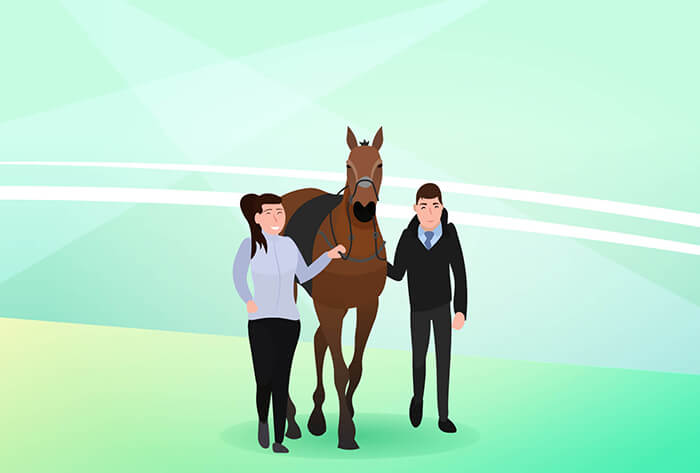The short answer is yes. All professional jockeys require a license to race, as well as a Level 2 Diploma. That said, you don’t need any qualifications, or experience in riding, to begin the process. On top of the qualifications, jockeys also need to be dedicated, skilled and extremely fit and healthy.
Complete novices need to do a pre-apprenticeship – this can be done at the British Racing School or the Northern Racing College. Both organisations run courses where you live on site and learn the ins and outs of horse racing for any career in the sport. The brilliant thing about them is that they are completely free as they are government funded (those who can afford it may be asked to pay for accommodation), and you require zero experience to apply, although the schools do receive a lot of applications.
The next step is to complete a (paid) apprenticeship at a yard. Both racing schools have good connections with different yards and will be able to help facilitate those steps. There, would-be jockeys work, often as a racing groom, underneath a trainer and their team.
Champion jump jockey and HRUK ambassador Bryony Frost says: “How you progress at a yard depends on your determination, your hard work and your ability to get up to speed with the demands that exist there. If you keep showing you’re plenty capable at your level, then you’ll progress. If you keep pushing yourself then you might get the opportunity to jump, and then step up to go into full schooling sessions.”
As Frost says: “Young jockeys have to go to trainers, it doesn’t work the other way round.” It’s the trainers that apply for a jockey’s license. When they think a jockey is good enough, they apply for a license and during the application process jockeys must pass a series of tests regarding fitness, riding skill and knowledge about the sport and the animals. This is all part of a system that ensures jockeys (as well as everybody else in the sport) conduct themselves properly, that they remain safe, and that they care for the horses correctly.
“You learn the rules,” says Frost. “You have to show that you can school a horse, muck them out, that your stick hand is proper, that you know when to pull a horse up, as well as what to do in certain scenarios, and ultimately show the right level of professionalism.”

In racing there are three types of jockey – professional, amateur and conditional (those looking to turn professional). Amateurs and conditionals can “claim” – whereby they can claim a reduction in the amount of weight a horse has to carry during a race. The more times that they win, the less weight that they can claim off.
Frost says: “You can have a straight amateur license, which only allows you to ride point-to-point races (amateur racing over fences at a specific point-to-point track), a category A, which allows you to ride in an amateur race under Rules as well, and then category B, which allows you to ride as an amateur in professional races, but you can’t go over 25 winners. At that point you have to decide whether to stay as an amateur or go conditional.”
“It takes 75 winners in total to ride out your claim. When you start on zero winners you claim 10lbs off a horse, then you go down to 7lbs, then 5lbs, then 3lb, then you’re out. The more winners you have, the more experience you have, the less you can claim. That’s standard across the board.”
Very. As you would expect, and as with most other sports, we’re talking about the best equine athletes in the world. According to the British Racing School, only around 5% of people who complete their course go on to become professional jockeys, although most go on to work in the sport in some capacity. You have to be extremely dedicated as it’s very competitive – according to British Horse Racing, there are only 450 professional jockeys in the UK riding today.
There are plenty of jobs within horse racing aside from being a jockey. As Frost says: “It’s not just racing. You don’t have to handle a horse if you don’t want to. You might want to work in race planning, in the yard as a groundsperson, or in the bloodstock or breeding side of the sport.”
If that’s the case then it’s still worth finding your local livery yard (a stable where horse owners pay to keep their horses housed) so you’re in constant contact with horses to see what aspects you like.